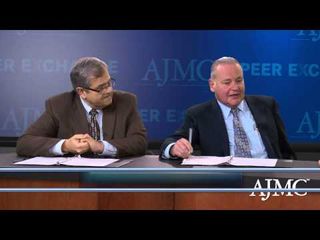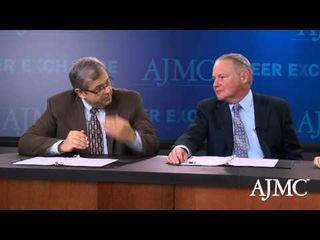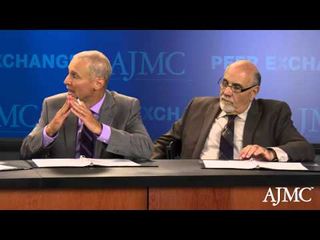
Value-Based Care
Latest News

Latest Videos

CME Content
More News

The University of Buffalo is working to limit patient readmissions to hospitals and ERs via use of dashboard technology.

As healthcare reform advances, experts say, dermatologists face mounting pressure to prove their mettle to insurance exchanges and accountable care organizations (ACOs).

To better align the care of beneficiaries insured under both the Medicaid and Medicare programs, CMS invited states to participate in a 3-year demonstration project. However, it seems that many beneficiaries have opted out of these care coordination programs that are offered across the country.

On the second day of "Patient-Centered Diabetes Care: Putting Theory Into Practice," Jan Berger, MD, MJ, president of Health Intelligence Partners, moderated the panel discussion "Measuring the Impact of Pharmacists in Diabetes Patient Care."

Dr. Vojta emphasized the importance of analyzing existing good patient data to improve care outcomes.

As part of its mission to bring together stakeholders engaged in implementing the Affordable Care Act, The American Journal of Managed Care created the ACO and Emerging Healthcare Delivery Coalition, which gives participants opportunities to share best practices in using new reimbursement models. The final panel of "Patient-Centered Diabetes Care: Putting Theory Into Practice" invited ACO Coalition members to present insights on diabetes care.

Pearson emphasized a coordination of care, between the primary care provider, the pharmacist, and payers, to improve patient care.

Personalized medicine will be expensive in these early days of pioneering and planning. But individual genomic testing is not going to be exorbitant forever — and the ROI is gonna be big, both in patient outcomes and dollars saved.

When it comes to value-based decision making, several factors can influence physician behavior. Although many organizations rely on financial incentives, the Commonwealth Fund argued in a report released Tuesday that healthcare leaders should think beyond the dollars and dimes.

More than 8 million Americans have signed up for health insurance thanks to the Patient Protection and Affordable Care Act. Significantly increasing access to care, the 4-year-old healthcare reform law also creates incentives for providers to reorganize the delivery of healthcare.

It is well known that oncology care pathways are the tools that practices can utilize to care for its patients. Ira Klein, MD, MBA, FACP, chief medical officer, National Accounts Clinical Sales & Strategy, Aetna, suggests that Aetna's only involvement in creating these pathways should be in helping these practices develop "reasonable care pathways."

The ACO and Emerging Healthcare Delivery Coalition, an initiative of The American Journal of Managed Care, hosted a recent Web-based session that featured three presentations on aspects of the transition to value-based care: why barriers to change persist, what steps one ACO is taking to drive better health, and why a "patient-centered" method of picking a doctor makes sense.

The National Committee for Quality Assurance (NCQA) proposed a program that would integrate patient-centered medical homes (PCMHs) with nontraditional ambulatory sites. If adopted, the program would assess the quality of care delivered at practices such as ambulatory care, urgent care centers, retail clinics, and worksite clinics.

Physician employment contracts with hospitals that were signed in the early days of healthcare reform are coming up for renewal Experts say the expectation of payment reform requires that these new deals include the flexibility to adapt to expected and unforseeable changes.

Primary care doctors surveyed by the Medical Group Management Association say nearly 6% of their compensation was pegged to quality metrics in 2013, up from 3% in 2012.

Laurel Pickering, MPH, president & CEO of the Northeast Business Group on Health, explains that employers are transitioning employees into consumers with the help of "transparency tools" centered around price and quality.

Federal agencies remain committed to increase patients' access to affordable, high quality, and comprehensive healthcare.

The leaders of ACOs are working their way through a welter of immediate and longer-term issues.

HHS Secretary Sylvia Mathews Burwell announced today the availability of $100 million from the Affordable Care Act to support an estimated 150 new health center sites across the country in 2015.

A CMS proposal would increase the number of quality measures that accountable care organizations (ACOs) would have to achieve under the Medicare Shared Savings Program in 2015.

Looking to control Medicaid costs, several states are launching accountable care initiatives that mirror experiments underway with Medicare and private insurers but vary significantly in their approaches.

The number of healthcare organizations participating in CMS's bundled payment program is expected to increase in upcoming weeks.

Panelists discussed the successes and failures associated with pathway implementation.

The panelists continued to discuss evidence-based medicine, as well as the incentives there might be to examine emerging and existing therapies or drugs.

In regard to updating pathways and guidelines, Dr Sonnad asked about the opportunity for newer, expensive immunotherapies to be included in a pre-determined pathway.











